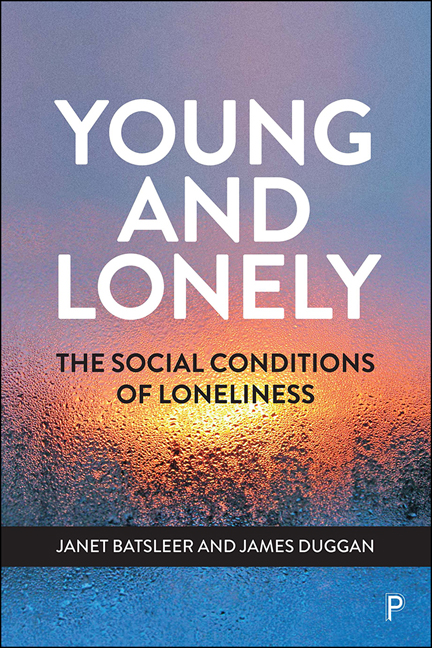Book contents
- Frontmatter
- Contents
- Notes on the Authors
- Acknowledgements
- Preface
- 1 Animate, Attune, Amplify
- 2 Finding Oneself a Loneliness Agenda
- 3 I’M New Here: Creating a New Research Project and A Young Person Led Research Agenda
- Part I The Social Conditions of Loneliness
- Part II The Experience of Loneliness
- Part III Building Friendship and Connection
- References
- Index
14 - New Ways For Thinking and Feeling Loneliness
Published online by Cambridge University Press: 18 March 2021
- Frontmatter
- Contents
- Notes on the Authors
- Acknowledgements
- Preface
- 1 Animate, Attune, Amplify
- 2 Finding Oneself a Loneliness Agenda
- 3 I’M New Here: Creating a New Research Project and A Young Person Led Research Agenda
- Part I The Social Conditions of Loneliness
- Part II The Experience of Loneliness
- Part III Building Friendship and Connection
- References
- Index
Summary
Loneliness Connects Us is the first significant UK study of youth loneliness with and from the perspective of young people. The approach developed through youth work research and practice methodologies, characterised by activity, association (learning together by doing) and challenge. We hosted weekly engagements with a core group of youth co-researchers to initiate a dialogue that expanded and intensified through a carousel of moving methods. We talked to and debated with one another. We talked as we made things. We listened to music together. We accompanied one another to social occasions such as the theatre and restaurants. As the research progressed the conversations among the youth co-research group were translated into an immersive theatre performance that toured the UK to grow and contextualise the dialogue. We developed legacy activities that included staging a youth summit, creating an online arts resource and mobilising the project findings through the mainstream media and with policy makers. In total we engaged over 200 young people and had conversations with numerous professionals. It is the breadth and plurality of the study's engagement with young people and youth loneliness that justifies the claim for the research's significance and made it such a privilege to undertake.
This concluding chapter returns to the youth co-researchers’ agenda to reflect on the findings and to explore implications for the youth loneliness research and policy agenda. We argue for reversing the individualisation of loneliness in research and practice in order to think in more expansive ways about youth loneliness and belonging. This begins from a necessary engagement with difference within the social and with the social conditions of loneliness including poverty, precarity and inequality. Building on the youth work–inspired creative co‑produced methods, we propose ways to re-found the youth loneliness agenda, specifically in committing to radical democratic practice. The chapter concludes with the recommendations (which were made at the end of the research project by the team) of things we can all do to help reduce youth loneliness
Loneliness beyond the individual
We identified a problematic cluster of ways in which loneliness is conceptualised and communicated: as contagious, a crisis, and individualising. The emotional contagion thesis is a leading explanation of the spread and emergence of loneliness (Cacioppo, 2009; Cacioppo et al, 2009).
- Type
- Chapter
- Information
- Young and LonelyThe Social Conditions of Loneliness, pp. 161 - 178Publisher: Bristol University PressPrint publication year: 2020

